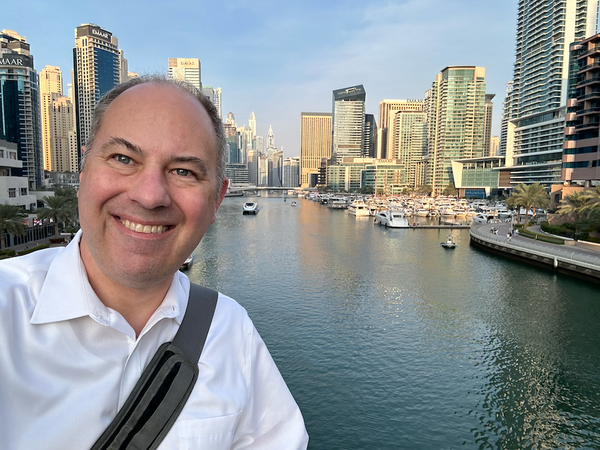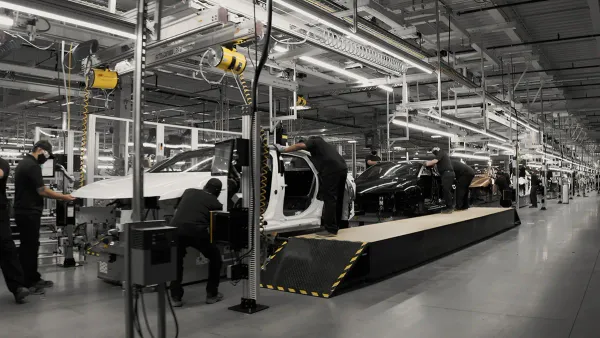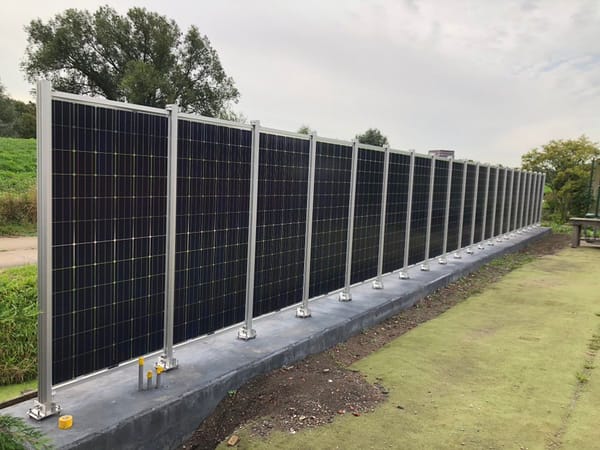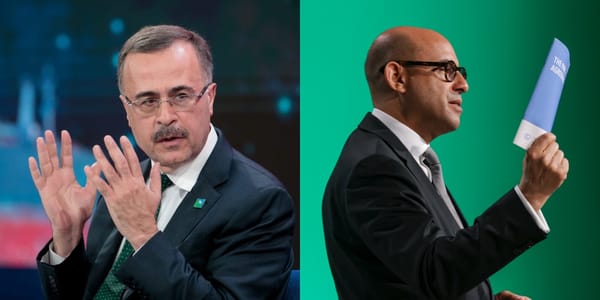Report from Dubai: Going into extra hours
Good evening from Dubai,
Today is the official last day of COP28, but there’s no agreement. So, it looks like we’re headed into an extra day, as we wait for a final negotiated statement. But now it’s late, and we don’t have answers yet. Here’s what I know at the moment.
-Mike
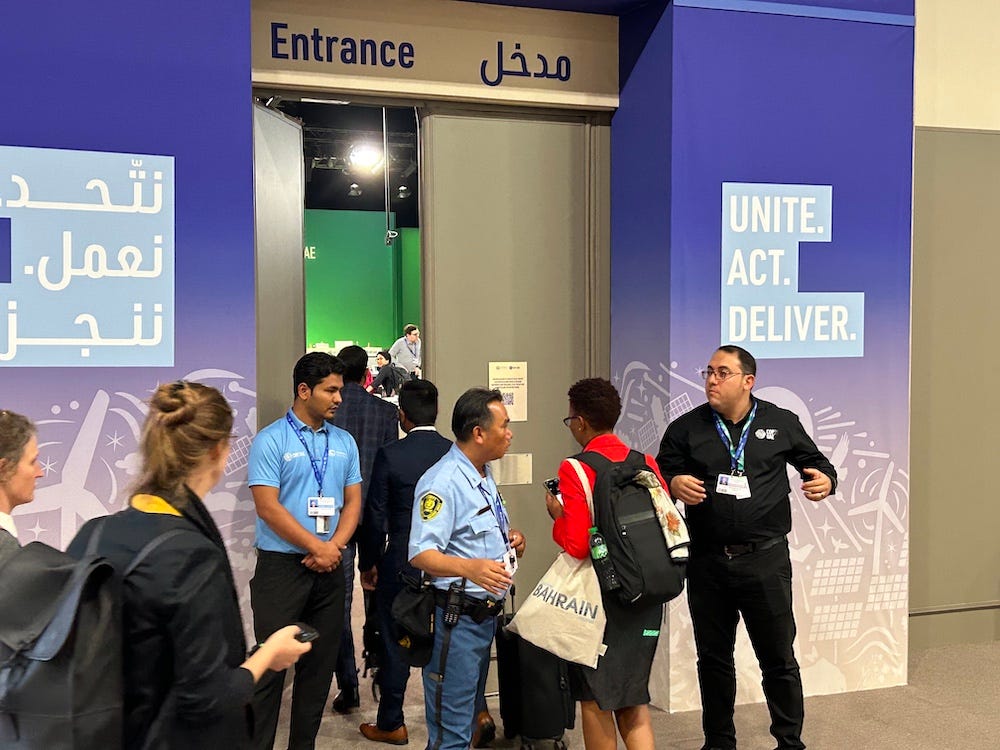
It’s just after 10:30 p.m. here. A few minutes ago the COP Presidency sent out a notice to press and delegations that “Consultations will continue until 03:00AM GST”. It was a form of relief to me and thousands of delegates, observers, and media waiting around. Now we know, nothing’s happening tonight so we can go home – unless you’re a negotiator, and that means it’s going to be a long, long night. The Marshall Island delegation, sitting next to me, brought in pizza from outside the conference center, and it smells heavenly.
Everyone’s been gossiping all day and night. Yesterday’s Global Stocktake texts drafted by the Presidency (not negotiators or meeting chairs) set off a firestorm of anger. This morning, a member of COP28 President Sultan Al Jaber’s staff tried to suggest that angering people was part of the plan.
“Lots of Parties felt it did not fully address their concerns,” said COP28 Director-General Majid Al Suwaidi. “We expected that. In fact, we wanted the text to spark conversations…and that is what happened.”
Regardless of the truth of that statement, for the rest of the day it has been hurry up and wait. Negotiators have been shuttling back and forth between meetings, and observers have been steadily trickling out of the conference center, as their plane tickets home come due. Dubai’s Expo City is now a ghost town compared to earlier this week.
Based on conversations with negotiators and observers, it seems President Al Jaber’s plan is this: Get everyone to agree to the whole text at once. Global Stocktake, financing, adaptation measures, the whole thing, and then release it in one go early in the morning. Next, hold a plenary session in late morning or early afternoon, gavel everything through and declare victory. Finally, everyone holds press conferences Wednesday afternoon then flies home Thursday morning.
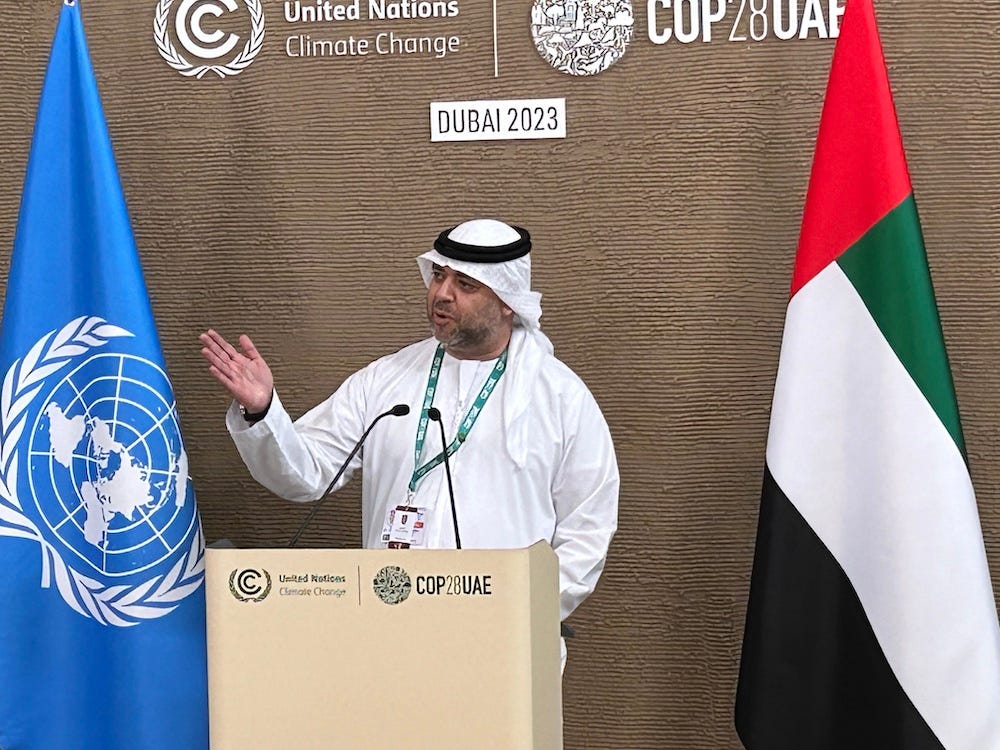
While that sounds like a great plan to me, since my ticket home is for Thursday morning, it also sounds like an incredible balancing act. I’ve been told by observers connected to developing countries that part of the negotiating plan is that until parties agree to mitigation measures (ways to stop warming) the discussion on adaptation finance (how to prepare for climate change) can’t begin. This apparently enraged developing countries, since they lack the money to pay for mitigation anyway, so finance and mitigation are closely linked.
Since there’s a big wait, and the Umbrella Group nations – U.S., Canada, Japan, and Australia – all said yesterday that they want to see “fossil fuel phase out” in the final language, there’s growing expectation for a blockbuster deal. There’s a lot of barriers to that, some of which I detail below, but who knows? It’s possible this is going to be an important moment. There certainly has been plenty of hype for the last two weeks.
What is the Global Stocktake about, anyway?
Part of the Paris Agreement includes a clause that every five years – and this year is the first cycle – scientists are to assess the world’s progress towards staying below 1.5°C. Above that level (we’re at 1.2 right now) scientists estimate the world will experience unrepairable damage to our global climate. Following each stocktake, countries are supposed to update their Nationally Determined Contributions (basically their climate action plan) and submit them to the U.N.
Earlier this year the Global Stocktake technical analysis found the world was far off track from staying under 1.5°C, and was instead on path towards 3°C. Thus, a large portion of COP28 negotiations has been focused on agreeing on pathways toward staying under 1.5°C – referred to as climate mitigation.
Mitigation efforts announced so far include curbing methane emissions, tripling renewables, and doubling efficiency methods by 2030. Still, however, a report released by the International Energy Agency found those mitigation efforts would only bring the world 30% towards 1.5°C.
Now, COP28 delegates are working to develop a statement in response to that technical analysis that endorses actions countries can take that would keep us below 1.5°C. Actions discussed include halting new coal production, eliminating fuel subsidies, financing developing world green energy projects, and setting a phase out period for all fossil fuels.
There are two important caveats however: First, that the statement is not legally binding. These are meant to be guidelines, although guidelines the entire world agrees on, so there is a significant moral impact and a giant diplomatic club that can be used against countries that don’t comply. Second, that because members of the United Nations Framework Convention for Climate Change (UNFCCC) never agreed on rules of procedure, every decision must be consensual. That means any one country can veto the whole process.
As a result, it is very possible one country could jam their heels in and refuse to allow the Global Stocktake text to move forward and the entire COP fails. That is part of what makes the current negotiation plan such a balancing act. At the last minute, one country – say Saudi Arabia – could bring everything to a crashing halt.
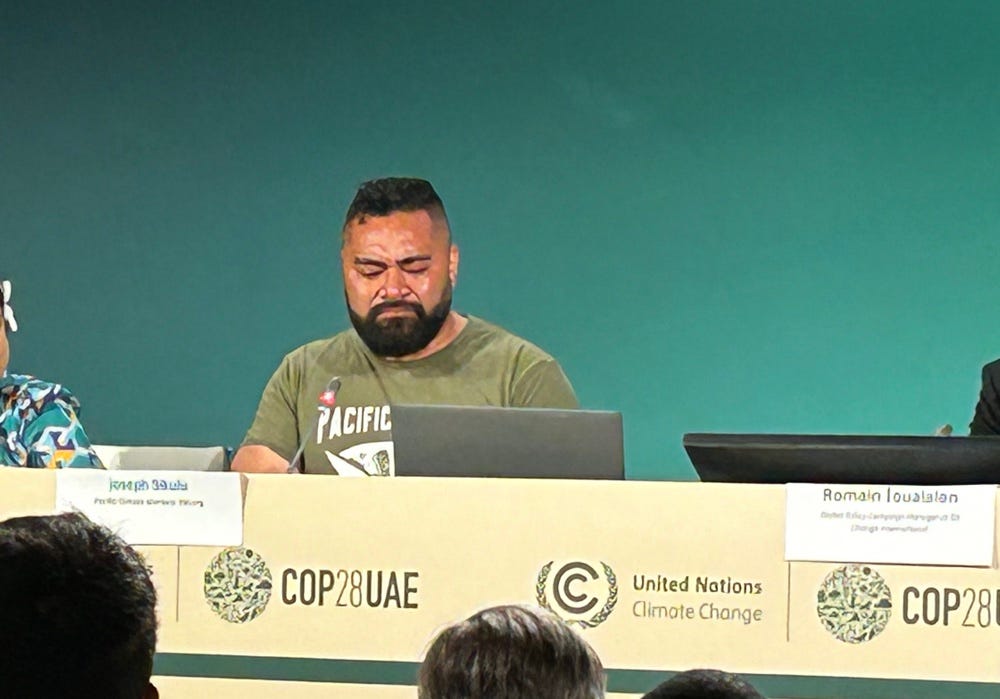
What’s The Politics of The Global Stocktake?
Global politics is a massive, interlocking series of alliances, including the G77, E.U., Alliance of Ocean and Single Island States, Like Minded Developing Countries, and many more (here’s a cheat sheet for some of them). The many, many alignments and needs of the countries makes the multilateral discussions extremely complicated. Here’s a partial rundown of the politics I’ve encountered on the Stocktake discussions so far:
AOSIS – Members of the Alliance of Ocean and Single Island States view continued climate change as an existential threat. Their countries are steadily being washed away and the already changing climate has impacted fisheries and increased deadly storms. They are committed to the toughest language possible, especially linking actions to what science demands – but they are tiny and have little political leverage.
Arab States – Mostly petrostates, these countries deeply depend on revenue flows from oil and gas. They view terminating fossil fuel use as an existential threat since the end of those revenue flows would likely result in tremendous social instability. They, led by Saudi Arabia and Iraq, are fighting fossil fuel bans at every step. The wealthier Arab states have also been dodging attempts for them to take on financing responsibilities, as they claim they are still “developing nations”. It doesn’t seem like that as you the metro in Dubai.
United States – Although it has a pro-climate president, for over 20 years the U.S. has been saddled with an anti-climate Congress that refuses to ratify climate agreements. Under this regime the U.S. can apply force on other countries to do things but is largely unable to take the lead on the big issues, such as financing poor country green energy efforts, or agreeing to make major emissions cuts. As a result, lead climate negotiator has turned the U.S. into more of a backroom operator, strategically applying pressure on the margins.
European Union – Traditionally the strongest proponent for climate action, this year the E.U. has been somewhat hamstrung by a growing rightist presence in some countries. While the E.U. set a negotiation goal for a fossil fuel phase out, there continues to be fossil fuel expansion in Norway, Poland, and other Eastern European states. Still, its representatives have become some of the strongest advocates for the words “phase out”.
India – The Indian economy has started to boom, and it needs energy. While it has grown renewables – particularly solar – at a fast clip, the country continues to rely on coal, which is significantly cheaper. Not coincidentally, the government announced yesterday that it is vastly increasing coal production. India seems opposed to any fossil fuel phase out, in particular coal.
China – Largely quiet in negotiations, China has taken a backroom role, remarkably working in tandem with the U.S. Some of this may because the country’s lead negotiator, Xie Zhenhua, has a close working relationship with the U.S.’s John Kerry. Last month China announced it will peak fossil fuel use by 2030 and it has internally committed to tripling renewables by 2030. But it is extremely dependent on imported oil and is now the world’s biggest carbon emitter.
Least Developed Countries – More exposed to climate change than any others, these countries are impacted by climate disasters without the financial resources for repairs – and they also have the lowest emissions because they have the smallest economies. These countries are almost uniformly pushing for a fossil fuel ban but are also demanding developed countries put in more money to finance their climate goals.
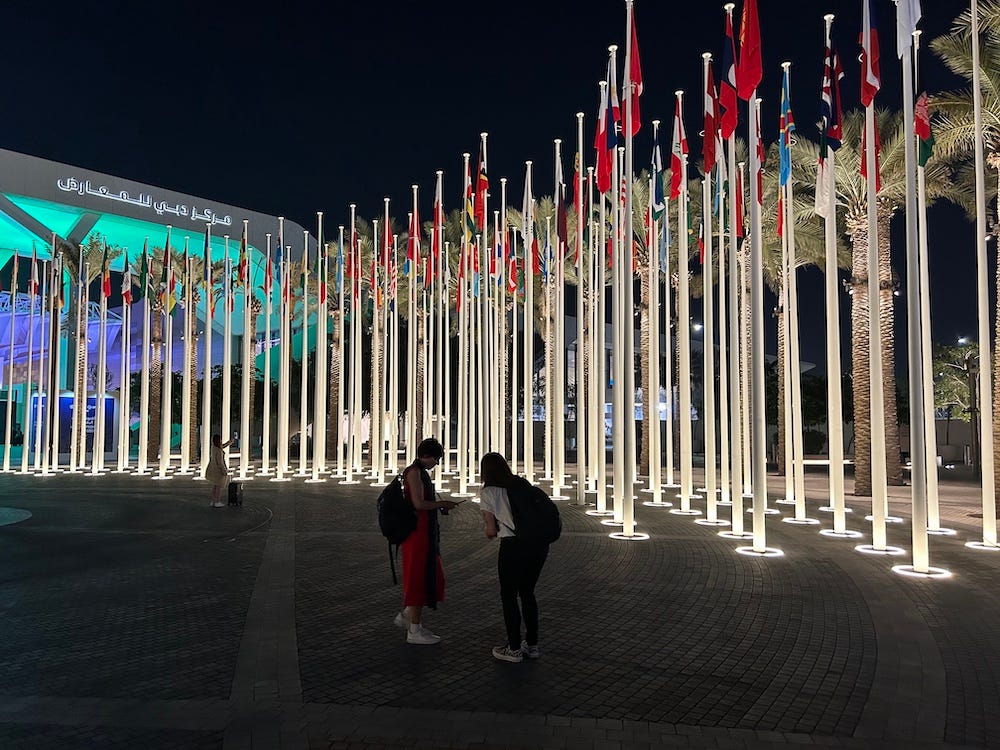
Diplomatic Dog Whistles
The negotiated texts are legal works of art, using specific terms that have meanings specific to climate diplomacy. Here’s some of what to look for.
“Should” – A paragraph might begin with “may”, “will”, or “should”. Of all of them, “should” is the weakest, and was in fact used in last night’s text leading the section of possible measures countries could take to improve the climate. The weakness of the word sent climate activists and island states into a tizzy.
“Common and differentiated responsibilities” – Essentially a way of saying that rich countries have more responsibilities than poor ones. This sounds fair, except China and most petrostates still count as developing countries in the U.N.’s eyes. Any agreement that requires China to do less than the U.S. will essentially kill the measure in Congress and hang an albatross around the president’s neck.
“Phase Out/Phase Down” – The big issue at hand: Will governments agree to phase out the use of fossil fuels, or instead a lighter term, “phase down”. Both terms lack full meaning without a timeline or milestones – but that could be part of a negotiated solution.
“Abate” – A completely undefined word that could mean any number of things. It’s generally assumed to mean buying carbon credits or running some kind of carbon capture and sequestration (CCS) system. The fact that CCS doesn’t really work yet concerns climate activists, but CCS and “abatement” is the main hook GHG polluters use to promote their green-ness.
“Science-based measures” – A term of art that means ensuring mitigation activities will result in staying below 1.5°C and most often the strictest measures possible.


